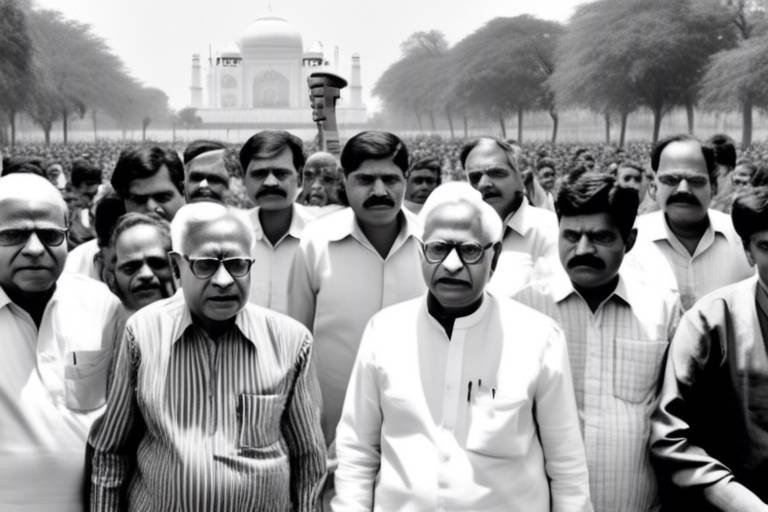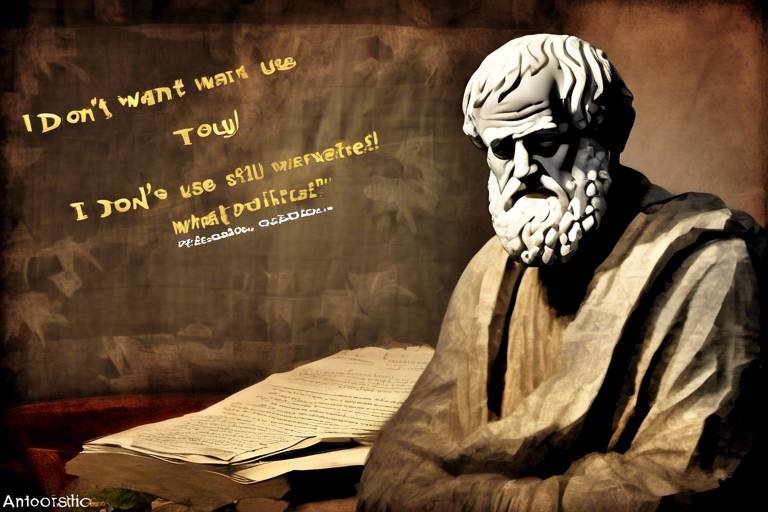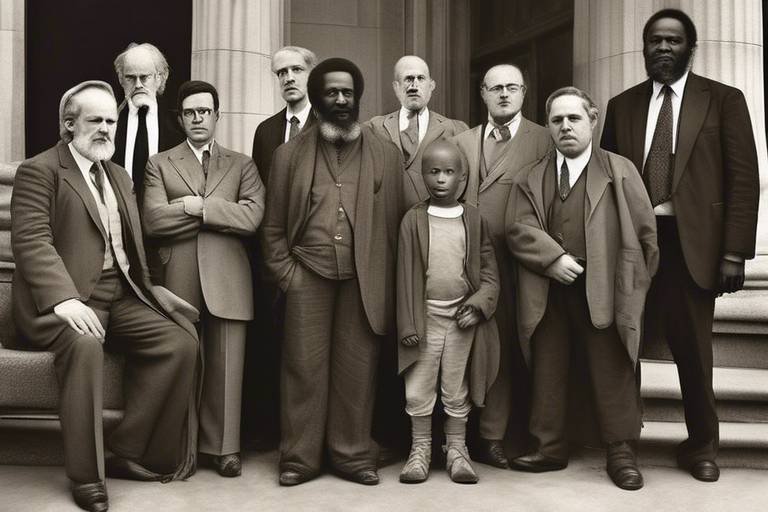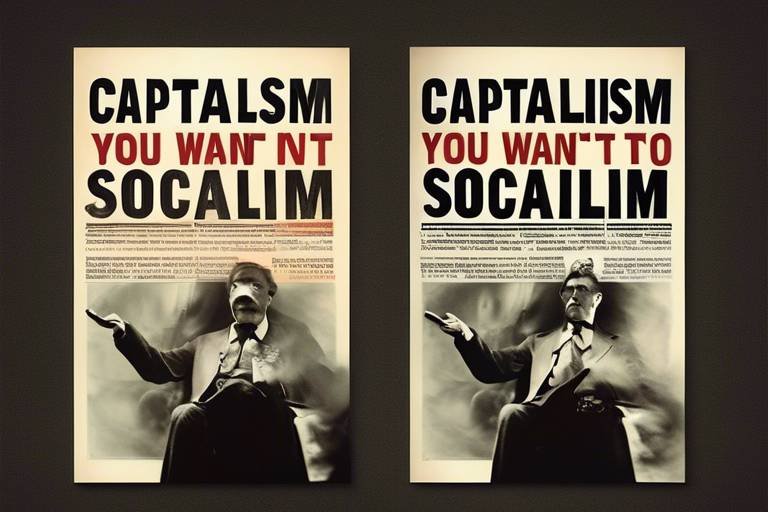How Political Philosophy Influences Economic Policies
The intricate relationship between political philosophy and economic policies is not just a theoretical exercise; it is a fundamental aspect of how societies organize their resources and govern their people. At its core, political philosophy provides the framework through which governments interpret their roles and responsibilities in the economy. Different philosophical ideologies, from libertarianism to socialism, offer varying perspectives on the balance between freedom and regulation, individual rights and collective welfare. So, how does this all play out in real-world scenarios? The answer lies in understanding the historical context, analyzing the thoughts of key philosophers, and observing contemporary practices.
To start, political philosophy has evolved over centuries, reflecting the changing dynamics of society. For instance, the Enlightenment period brought forth ideas about democracy and individual rights, which directly influenced economic systems that prioritize personal freedom and market competition. In contrast, the industrial revolution highlighted the need for social safety nets, leading to the emergence of socialist ideas that advocate for government intervention in the economy. This historical backdrop is essential in grasping how past ideologies continue to shape modern governance and economic strategies.
As we delve deeper, we encounter pivotal figures in political philosophy whose ideas have left an indelible mark on economic policies. Think about John Locke, who championed the notion of private property and individual rights. His ideas laid the groundwork for capitalism, influencing policies that favor free markets. On the other hand, Karl Marx critiqued capitalism, arguing that it inherently leads to class struggles and inequality. His vision of a classless society has inspired numerous movements and policies aimed at wealth redistribution. These contrasting perspectives create a rich tapestry of thought that informs how governments make economic decisions today.
When we examine the implications of these philosophies, we find that they manifest in various ways. For example, the libertarian approach advocates for minimal government intervention, promoting the idea that free markets can self-regulate effectively. This philosophy has led to significant deregulation in industries, with proponents arguing that such an environment fosters innovation and economic growth. However, this perspective is not without its critiques. Detractors argue that unregulated markets can lead to inequality and exploitation, raising questions about the ethical implications of prioritizing market freedom over social welfare.
Conversely, socialist ideologies emphasize the need for economic equality and social welfare. They advocate for government intervention to redistribute wealth and provide essential services to citizens. This approach can be seen in various countries that prioritize healthcare, education, and social safety nets as fundamental rights. The ongoing debate between these two schools of thought is a testament to the complexity of economic policymaking and the influence of political philosophy on shaping societal values.
In summary, the interplay between political philosophy and economic policies is a dynamic and evolving relationship. By understanding the historical context and key thinkers, we can better appreciate how different ideologies influence the decisions made by governments around the world. As we move forward, it is crucial to consider the implications of these philosophies in addressing contemporary issues such as globalization and climate change, which require innovative and ethical economic strategies.
- How does political philosophy affect economic policies? Political philosophy shapes the values and priorities of governments, influencing decisions on regulation, welfare, and market freedom.
- What are the main political philosophies that impact economics? The primary philosophies include libertarianism, socialism, and social democracy, each advocating different levels of government intervention in the economy.
- Can you provide examples of political philosophies in practice? Yes, the Scandinavian model demonstrates a blend of socialism and capitalism, while authoritarian regimes often show the limitations of centralized economic control.

Historical Context of Political Philosophy
Understanding the historical evolution of political philosophy is crucial for grasping how contemporary economic policies are shaped. Political philosophy is not a static field; it has evolved over centuries, influenced by social, economic, and technological changes. From the ancient Greeks, who pondered the nature of justice and the ideal state, to modern thinkers who grappled with issues of individual rights and state power, each era has contributed unique insights that continue to inform today's governance.
In ancient times, philosophers like Plato and Aristotle laid the foundations of political thought. Plato envisioned a society governed by philosopher-kings, where the common good was prioritized over individual interests. Aristotle, on the other hand, emphasized the importance of virtue and ethics in politics, advocating for a balanced approach that considers both the community and the individual.
As we moved into the Enlightenment period, thinkers such as John Locke and Thomas Hobbes introduced ideas about the social contract and natural rights. Locke's belief in individual liberty and property rights became a cornerstone for modern democratic thought, influencing the development of capitalist economies. Conversely, Hobbes's view of a strong, centralized authority highlighted the tension between freedom and security, a debate that persists in political discourse today.
The 19th century brought forth radical changes with the rise of socialism and the critique of capitalism, primarily through the works of Karl Marx. Marx's analysis of class struggle and his call for the redistribution of wealth challenged the status quo, leading to various interpretations of socialism that sought to address economic inequalities. This historical context is vital as it illustrates how past ideologies have sown the seeds for modern economic systems and policies.
To further understand this evolution, let’s consider the following table that outlines key political philosophers and their contributions:
| Philosopher | Key Ideas | Influence on Economic Policy |
|---|---|---|
| Plato | Philosopher-kings, ideal state | Emphasis on collective good |
| Aristotle | Virtue ethics, balanced governance | Importance of civic responsibility |
| John Locke | Natural rights, social contract | Foundation for capitalist economies |
| Karl Marx | Class struggle, wealth redistribution | Critique of capitalism, rise of socialism |
This historical perspective not only enriches our understanding of political philosophy but also highlights how these foundational ideas resonate in today’s economic policies. Each philosophical framework offers different solutions to economic challenges, reflecting the values and priorities of the time. As we navigate the complexities of the modern world, recognizing these influences can help us appreciate the diverse approaches to governance and economic management.

Key Political Philosophers and Their Economic Theories
When we dive into the world of political philosophy, we uncover a treasure trove of ideas that have fundamentally shaped our economic systems. Think of political philosophers as the architects of society, laying down the blueprints that guide governments in their economic strategies. Each philosopher offers a unique lens through which we can examine the intricate relationship between governance and economic policies. For instance, John Locke, often hailed as the father of liberalism, championed the idea of private property and individual rights. His belief that individuals have the right to own property has influenced capitalist economies, where the pursuit of personal wealth is not just encouraged but celebrated.
On the other hand, we have Karl Marx, a figure synonymous with socialism and communism. Marx critiqued the capitalist system, arguing that it inherently leads to class struggles and economic inequalities. His ideas paved the way for economic policies that prioritize wealth redistribution and social welfare, aiming to create a society where resources are shared more equitably. This dichotomy between Locke's emphasis on individualism and Marx's focus on collectivism illustrates the broad spectrum of thought within political philosophy.
These two philosophers represent just the tip of the iceberg. Other influential thinkers, such as Adam Smith, known as the father of modern economics, advocated for a free market economy where the "invisible hand" of the market guides supply and demand. His ideas laid the groundwork for laissez-faire economics, suggesting that minimal government intervention leads to optimal economic outcomes. In contrast, John Maynard Keynes introduced a more interventionist approach, arguing that during economic downturns, government spending is necessary to stimulate demand and pull economies out of recession.
To better understand how these philosophies translate into economic policies, let's look at a comparative table of their key ideas:
| Philosopher | Core Ideas | Economic Implications |
|---|---|---|
| John Locke | Individual rights, private property | Capitalism, free markets |
| Karl Marx | Class struggle, wealth redistribution | Socialism, communism |
| Adam Smith | Free markets, self-regulation | Laissez-faire economics |
| John Maynard Keynes | Government intervention, demand stimulation | Mixed economy, welfare state |
As we explore these philosophical underpinnings, it's essential to recognize that the economic policies they inspire are not merely theoretical. They manifest in the real world, influencing everything from taxation to social services. The clash between these ideologies often leads to heated debates in political arenas, as different groups advocate for the economic systems they believe will best serve society. Understanding these foundational theories helps us navigate the complex landscape of contemporary economic policies and their implications for our lives.
In summary, the ideas of these key political philosophers are not just relics of the past; they are alive and well in today's economic discourse. Their principles continue to shape governmental decisions, guiding nations in their quest for economic prosperity and social justice. As we continue to grapple with pressing economic issues, revisiting these foundational philosophies can provide valuable insights into the paths we choose to take.

Libertarianism and Free Market Economics
Libertarianism stands as a compelling philosophy that champions the idea of minimal government intervention in both personal lives and economic activities. At its core, libertarianism posits that individuals should have the freedom to make choices without undue interference from the state. This principle extends naturally into the realm of economics, where libertarians advocate for free market economics. They argue that when markets are left to operate without government restrictions, they can self-regulate, leading to optimal outcomes for society as a whole.
Imagine a bustling marketplace where buyers and sellers interact freely, setting prices based on supply and demand. This vibrant scene is what libertarians envision when they talk about free markets. They believe that the invisible hand of the market, a concept popularized by Adam Smith, can guide economic activity in a way that is beneficial for everyone. The idea is that individuals acting in their own self-interest inadvertently contribute to the overall good of society. But is it really that simple?
One of the most significant impacts of libertarianism on economic policy is the push for deregulation. Proponents argue that reducing regulations allows businesses to innovate and compete more effectively, ultimately driving economic growth. For instance, in industries like technology and telecommunications, deregulation has spurred rapid advancements and lower prices for consumers. However, this approach is not without its critics. Detractors argue that a lack of regulation can lead to market failures, where the interests of the few outweigh the needs of the many.
Critics of libertarian economics often point to the potential for inequality and exploitation in an unregulated market. They argue that, without a safety net, the most vulnerable in society may suffer disproportionately. This concern raises a critical question: can a system that prioritizes individual freedom truly be fair for everyone? Critics advocate for a more balanced approach, suggesting that some degree of regulation is necessary to protect consumers and ensure equitable opportunities for all.
To better understand the implications of libertarianism on economic policies, consider the following table that outlines the key principles and their potential impacts:
| Principle | Description | Potential Impact |
|---|---|---|
| Minimal Government | Advocates for limited government roles in economic affairs | Increased individual freedoms, but potential for inequality |
| Free Markets | Markets operate without government interference | Innovation and competition, but risk of market failures |
| Deregulation | Reduction of government rules and regulations | Lower costs for consumers, but can lead to exploitation |
In conclusion, while libertarianism and free market economics offer a compelling vision of individual freedom and self-regulation, they also present significant challenges. The tension between promoting economic growth and ensuring social equity remains a hotly debated topic. As we navigate the complexities of modern economies, the principles of libertarianism will undoubtedly continue to influence policy decisions, prompting ongoing discussions about the best path forward for society.

Impact on Regulatory Frameworks
The libertarian perspective has a profound impact on regulatory frameworks across various industries. Advocates of this philosophy argue that minimal government intervention allows for a more dynamic and efficient marketplace. They believe that when individuals and businesses are free to operate without excessive regulations, innovation flourishes, leading to economic growth and prosperity. This belief is rooted in the idea that the market is best equipped to regulate itself, much like a well-tuned machine that operates smoothly when left alone.
For instance, in sectors such as technology and finance, deregulation has often been championed as a means to stimulate competition and lower prices for consumers. The removal of stringent regulations is viewed as a way to encourage start-ups and small businesses to enter the market, thus promoting diversity and choice for consumers. However, the reality is more nuanced. While deregulation can lead to short-term gains, it may also result in long-term consequences that can undermine the very principles of a free market.
Consider the financial crisis of 2008, which many analysts attribute to a lack of adequate regulatory oversight. The rush to deregulate the banking industry created an environment ripe for risky behaviors and unethical practices. This example raises an important question: can we truly rely on the market to self-regulate, or do we need a safety net to protect consumers and maintain economic stability?
To illustrate the balance between regulation and free-market principles, let's look at some key areas impacted by libertarian ideologies:
| Industry | Impact of Deregulation | Potential Risks |
|---|---|---|
| Financial Services | Increased competition and lower fees | Risky lending practices and market crashes |
| Telecommunications | Lower prices and improved services | Monopolies and reduced access for rural areas |
| Environmental Regulations | Lower operational costs for businesses | Environmental degradation and public health issues |
As seen in the table above, while deregulation can lead to immediate benefits, it also carries significant risks that can jeopardize the stability of the economy and the well-being of society. Critics of libertarian economics argue that a purely free-market approach can exacerbate inequalities, leaving vulnerable populations without the protections they need. This highlights the importance of finding a middle ground where regulatory frameworks are designed not to stifle innovation but to ensure fairness and accountability.
Ultimately, the challenge lies in crafting regulations that strike a balance between fostering economic growth and safeguarding public interests. The ongoing debate around the role of government in economic affairs serves as a reminder that while the ideals of libertarianism promote individual freedoms, a well-regulated market is essential for sustainable development and social equity.
- What is libertarianism? Libertarianism is a political philosophy that emphasizes individual liberty, free markets, and minimal government intervention in both personal and economic matters.
- How does libertarianism affect economic policies? Libertarianism advocates for deregulation and free-market principles, which can lead to increased competition and innovation but may also result in economic inequalities.
- Are there any risks associated with deregulation? Yes, deregulation can lead to market failures, economic crises, and increased inequality if not balanced with adequate oversight and consumer protections.
- Can a balance be achieved between free markets and regulation? Finding a balance is crucial; effective regulations can protect consumers and ensure fair competition while still promoting innovation and economic growth.

Critiques of Libertarian Economics
While libertarian economics champions the idea of minimal government intervention and the power of the free market, it is not without its critics. One of the primary concerns is that unregulated markets can lead to significant inequality. In a system where wealth accumulation is largely left to individual initiative, the gap between the rich and the poor can widen dramatically. This disparity raises questions about social justice and the ethical implications of allowing a few to amass vast fortunes while others struggle to meet basic needs.
Moreover, critics argue that a purely libertarian approach often overlooks the necessity of public goods and services, such as education, healthcare, and infrastructure, which are essential for a functioning society. Without some level of government intervention, these services may become inaccessible to those who need them most. For instance, if left entirely to the market, healthcare could become a privilege of the wealthy, leaving lower-income individuals without essential medical care.
Another significant critique revolves around the concept of market failures. Libertarians often assert that markets are self-correcting, but this perspective can be dangerously simplistic. In reality, markets can fail due to monopolies, externalities, and information asymmetries. For example, pollution is a classic case of a negative externality, where the costs of production are not borne by the producers but rather by society at large. Without regulatory oversight, companies may prioritize profit over environmental sustainability, leading to detrimental effects on public health and the ecosystem.
Furthermore, the argument that deregulation fosters innovation is not universally accepted. Critics contend that while competition can drive innovation, a lack of regulations can also lead to reckless behavior among businesses. This can result in crises such as financial meltdowns, as seen in the 2008 financial crisis, where unregulated lending practices led to widespread economic fallout. The libertarian assumption that all players in the market act rationally and ethically fails to account for the potential for greed and malpractice.
In conclusion, while libertarian economics promotes individual freedom and market efficiency, it is essential to recognize the potential downsides. The critiques highlight the need for a balanced approach that considers both the benefits of free markets and the necessity of government intervention to ensure social equity, public welfare, and sustainable economic practices.
- What is libertarian economics? Libertarian economics is a political philosophy that advocates for minimal government intervention in the economy, promoting free markets as the best means of achieving prosperity.
- What are the main critiques of libertarian economics? Critics argue that it can lead to inequality, neglect public goods, overlook market failures, and promote reckless business practices.
- How does libertarian economics affect social welfare? It often prioritizes individual freedoms over social welfare, which can result in inadequate access to essential services for lower-income individuals.
- Can unregulated markets lead to innovation? While some argue that deregulation fosters innovation, critics suggest that it can also lead to crises and unethical business practices.

Socialism and Economic Equality
Socialism, at its core, is a political philosophy that emphasizes the importance of economic equality and the welfare of the community over individual profit. It advocates for a system where the means of production, distribution, and exchange are owned or regulated by the community as a whole. This approach aims to eliminate the vast disparities in wealth and power that often arise in capitalist societies. One of the fundamental beliefs of socialism is that everyone deserves access to basic necessities such as healthcare, education, and housing, regardless of their economic status. This belief is rooted in the idea that a society can only thrive when all its members have the opportunity to succeed.
To understand how socialism seeks to promote economic equality, we can look at various models that have been implemented around the world. For instance, Scandinavian countries like Sweden, Norway, and Denmark exemplify a successful integration of socialist principles within a capitalist framework. These nations have adopted policies that ensure a robust social safety net while encouraging economic innovation. They achieve this balance through progressive taxation, which redistributes wealth and funds public services, thereby reducing income inequality.
Moreover, socialists argue that government intervention is crucial in regulating the economy to prevent monopolies and protect workers' rights. The emphasis on social welfare leads to the establishment of programs designed to support those in need. These programs can include:
- Universal healthcare: Ensuring that all citizens have access to medical services without financial burden.
- Public education: Providing free or affordable education to promote equal opportunities for all.
- Social security: Offering financial support to the elderly, disabled, and unemployed individuals.
Critics of socialism often argue that such systems can lead to inefficiencies and a lack of motivation for individuals to excel. They claim that when the government takes control of essential services, it can stifle innovation and personal responsibility. However, proponents counter that the benefits of economic equality and social welfare far outweigh these concerns. They argue that a society that prioritizes the well-being of its members fosters a more cohesive and productive community.
In conclusion, socialism advocates for a more equitable distribution of resources, aiming to create a society where everyone has the opportunity to thrive. By focusing on economic equality, socialists believe that they can build a fairer world where wealth is not concentrated in the hands of a few, but shared among all. This vision challenges the status quo and invites us to rethink our understanding of success and prosperity.
Q: What is the main goal of socialism?
A: The main goal of socialism is to achieve economic equality and ensure that everyone has access to basic needs, such as healthcare, education, and housing.
Q: How does socialism differ from capitalism?
A: While capitalism emphasizes individual ownership and profit, socialism focuses on community ownership and the redistribution of wealth to reduce inequality.
Q: Are there successful examples of socialism in practice?
A: Yes, countries like Sweden and Norway have successfully implemented socialist principles within a capitalist framework, promoting economic equality while maintaining a competitive economy.
Q: What are some criticisms of socialism?
A: Critics argue that socialism can lead to inefficiencies and reduce individual motivation, as government control over services may stifle innovation and personal responsibility.

Case Studies of Political Philosophy in Practice
When we talk about the real-world implications of political philosophy, it's essential to look at case studies that illustrate how these ideas play out in practice. Different political philosophies have led to various economic policies, yielding successes and failures that provide valuable lessons. For instance, the Scandinavian model of social democracy stands out as a prime example of how blending socialism with capitalism can create a robust economy while ensuring social welfare. In countries like Sweden, Norway, and Denmark, the government plays a significant role in providing essential services such as healthcare and education, funded by high taxation. However, this isn't just about taking money from the rich and giving it to the poor; it's also about creating a system that fosters innovation and economic competitiveness.
On the flip side, we have seen the failures of authoritarian economic policies, which often stem from a rigid interpretation of political philosophies. In countries where centralized control is the norm, such as North Korea, the economy tends to stagnate. Without the checks and balances that democratic systems provide, these regimes can become inefficient, leading to shortages and a lack of innovation. The contrast between these two models—Scandinavian social democracy and authoritarian regimes—highlights the importance of political philosophy in shaping economic outcomes. It raises the question: can a society thrive economically without the freedoms that come with democratic governance?
To further illustrate these points, let's take a closer look at the Scandinavian model and its key features:
| Feature | Scandinavian Model | Authoritarian Model |
|---|---|---|
| Government Role | Active in welfare and regulation | Centralized control over economy |
| Taxation | High, but with high-quality public services | Variable, often with corruption |
| Innovation | Encouraged through competition | Stifled due to lack of freedom |
| Social Safety Net | Comprehensive coverage | Minimal or absent |
As we analyze these contrasting models, it becomes evident that the philosophical underpinnings of each system directly influence their economic policies and outcomes. The Scandinavian model demonstrates that a balance between government intervention and market freedom can lead to both economic growth and social welfare. In contrast, the failures of authoritarian regimes serve as a cautionary tale about the dangers of neglecting individual freedoms and democratic principles.
In conclusion, the case studies of political philosophy in practice reveal a complex interplay between ideology and economic policy. They challenge us to consider how our own political beliefs shape the world around us and what lessons we can learn from the successes and failures of others. Are we willing to embrace a philosophy that prioritizes both economic efficiency and social equity, or will we continue to see the pitfalls of rigid ideologies that ignore the human factor?
- What is the Scandinavian model of social democracy?
The Scandinavian model combines elements of socialism and capitalism, emphasizing a strong welfare state alongside a competitive market economy. - How do authoritarian regimes impact economic growth?
Authoritarian regimes often stifle innovation and efficiency due to lack of competition and centralized control, leading to economic stagnation. - Can political philosophy change economic policy?
Yes, political philosophy significantly influences economic policies, shaping how governments approach taxation, regulation, and social welfare.

Scandinavian Model of Social Democracy
The Scandinavian model of social democracy is often heralded as a shining example of how to balance economic competitiveness with robust social welfare systems. Countries like Sweden, Norway, and Denmark have successfully integrated principles of socialism and capitalism, creating a unique framework that prioritizes social equity while fostering innovation and growth. This model operates on the premise that a healthy economy is one that supports its citizens, ensuring that basic needs are met through comprehensive welfare programs.
At the heart of this model is the belief that government intervention can coexist with free-market principles. This means that while businesses are encouraged to thrive and compete, the government plays a crucial role in regulating the economy and providing essential services. The Scandinavian countries typically offer extensive social benefits, including universal healthcare, free education, and generous parental leave policies. These programs not only enhance the quality of life for citizens but also contribute to a more productive workforce, as individuals feel secure and supported.
One of the key components of the Scandinavian model is its emphasis on progressive taxation. This tax system is designed to redistribute wealth more equitably across society, helping to reduce income inequality. The funds generated through these taxes are reinvested into public services, creating a cycle of support that benefits everyone. For instance, the tax revenue is often allocated as follows:
| Service | Percentage of Tax Revenue |
|---|---|
| Healthcare | 30% |
| Education | 25% |
| Social Services | 20% |
| Infrastructure | 15% |
| Public Safety | 10% |
This approach not only supports those in need but also fosters a sense of community and shared responsibility. Citizens in these countries often report high levels of satisfaction with their quality of life, attributing this to the strong social safety net provided by their governments. Moreover, the Scandinavian model has shown that economic growth can coexist with social welfare, as these nations consistently rank among the highest in terms of GDP per capita and overall happiness.
However, it’s essential to recognize that this model is not without its challenges. Critics argue that high taxes can stifle entrepreneurship and innovation, potentially leading to a less dynamic economy. Nevertheless, proponents counter that the benefits of a well-educated, healthy, and secure population far outweigh these concerns. In essence, the Scandinavian model demonstrates that it is indeed possible to create a thriving economy while ensuring that all citizens have access to the resources they need to succeed.
In conclusion, the Scandinavian model of social democracy offers valuable insights into how political philosophy can shape economic policies. By prioritizing social welfare alongside economic competitiveness, these countries have created a sustainable framework that other nations might aspire to emulate. As global challenges continue to evolve, the lessons learned from the Scandinavian experience may prove crucial in addressing issues such as inequality and economic instability.
- What are the key features of the Scandinavian model? The key features include a strong welfare state, universal healthcare, free education, and progressive taxation.
- How does the Scandinavian model promote economic growth? By investing in public services and ensuring a healthy, educated workforce, the model fosters productivity and innovation.
- Are there any criticisms of the Scandinavian model? Some critics argue that high taxes can deter entrepreneurship; however, supporters believe the benefits outweigh these drawbacks.
- Can other countries adopt the Scandinavian model? While elements of the model can be adapted, each country must consider its unique social, economic, and political context.

Failures of Authoritarian Economic Policies
When we think about authoritarian regimes, it's easy to picture strict governance and limited freedoms. However, what often gets overlooked are the economic policies that arise from such systems. These policies frequently lead to significant failures, primarily because they prioritize control over creativity and responsiveness to the market. In essence, the lack of **democratic engagement** and **transparency** can stifle innovation and economic growth. One stark example is the centrally planned economies that have struggled to adapt to changing global markets.
Authoritarian regimes tend to implement policies that are top-down rather than bottom-up. This means decisions are made by a small group of leaders, often without the input of the general populace or local businesses. As a result, these policies can become disconnected from the actual needs of the economy. For instance, in the former Soviet Union, the government dictated production quotas and resource allocation without considering consumer demand. This led to widespread shortages of goods, as the system was unable to respond to the fluctuations in what people actually wanted or needed.
Moreover, the **lack of competition** in authoritarian economies can lead to inefficiencies. Without the pressure to innovate or improve services, state-run enterprises often become stagnant. This is evident in countries like Venezuela, where government control over oil production has led to mismanagement and a collapse of the economy. The absence of competition means there's little incentive for companies to improve their products or services, which can result in a decline in quality and availability.
| Country | Economic Policy | Outcome |
|---|---|---|
| Soviet Union | Centrally Planned Economy | Widespread shortages and inefficiencies |
| Venezuela | State Control of Oil | Economic collapse and poverty |
| North Korea | Isolationist Policies | Severe famine and economic stagnation |
Additionally, authoritarian regimes often suppress dissent and limit freedom of expression. This not only affects political rights but also economic ones. Entrepreneurs and innovators may fear repercussions for expressing new ideas or challenging the status quo, leading to a culture of conformity rather than creativity. For example, in North Korea, the government’s oppressive policies have resulted in a stunted economy that struggles to provide basic needs for its citizens.
In conclusion, the failures of authoritarian economic policies are multifaceted. They stem from a combination of poor decision-making, lack of competition, and suppression of innovation. While these regimes may achieve short-term stability, the long-term consequences often lead to economic decline and social unrest. As history shows, a more democratic approach that values **individual freedoms** and **market responsiveness** tends to yield better results, fostering an environment where economies can thrive.
- What are the main characteristics of authoritarian economic policies?
Authoritarian economic policies are characterized by centralized decision-making, limited competition, and lack of transparency, often leading to inefficiencies and poor economic outcomes.
- Can authoritarian regimes ever succeed economically?
While some authoritarian regimes may achieve short-term economic growth, they often struggle with long-term sustainability due to lack of innovation and responsiveness to market needs.
- What are the alternatives to authoritarian economic policies?
Democratic economic policies that encourage competition, innovation, and public participation tend to produce more sustainable and equitable economic outcomes.

Contemporary Issues in Political Philosophy and Economics
In today’s rapidly changing world, the intersection of political philosophy and economics has never been more critical. As we face challenges like globalization and climate change, the way we think about governance and economic policies becomes essential. Different political philosophies offer unique lenses through which to view these pressing issues, and understanding these perspectives can help us navigate the complexities of modern society.
Globalization, for instance, brings with it a host of economic challenges and opportunities that require thoughtful political responses. As countries become increasingly interconnected, the debate intensifies over how to balance free trade with the protection of local industries and labor rights. Some political philosophies advocate for a laissez-faire approach, arguing that open markets lead to greater innovation and efficiency. Others, however, stress the importance of government intervention to safeguard jobs and ensure fair labor practices. This dichotomy raises an important question: how do we ensure that globalization benefits everyone, rather than just a select few?
Moreover, as nations grapple with the reality of climate change, the philosophical underpinnings of environmental policies become a focal point of debate. Different political ideologies propose varying solutions to combat this existential threat. For instance, liberalism may emphasize market-based solutions, such as carbon trading, while socialist perspectives might advocate for more direct government intervention in the economy to enforce strict environmental regulations. The challenge lies in finding a balance that promotes sustainability while also considering economic growth.
To illustrate the impact of political philosophy on economic strategies, consider the following table that outlines how different ideologies approach climate change:
| Political Philosophy | Approach to Climate Change | Key Policies |
|---|---|---|
| Libertarianism | Market-driven solutions | Carbon trading, tax incentives for green technology |
| Socialism | Government intervention | Regulations on emissions, investment in renewable energy |
| Conservatism | Balanced approach | Support for innovation while promoting traditional energy sources |
As we can see, each political philosophy not only shapes economic policies but also influences public sentiment and action toward pressing global issues. The ongoing debate about how to tackle climate change is a prime example of how political philosophy can either hinder or facilitate effective action. With the stakes so high, it’s crucial to engage in these discussions and consider the long-term implications of our economic choices.
In conclusion, contemporary issues such as globalization and climate change highlight the profound impact of political philosophy on economic policies. By understanding these relationships, we can better navigate the complexities of our world and work toward solutions that are equitable and sustainable. As we move forward, the questions we ask and the philosophies we embrace will shape the future of our economies and societies.
- How do political philosophies influence economic policies?
Political philosophies provide the foundational beliefs that guide governmental decisions and economic strategies. Different ideologies prioritize various aspects of governance, leading to diverse approaches in policy-making. - What role does globalization play in contemporary economic issues?
Globalization connects economies and cultures, presenting both challenges and opportunities. It influences trade policies, labor rights, and economic inequalities, prompting debates among different political philosophies. - How can political philosophy help address climate change?
Political philosophy shapes the ethical frameworks within which climate policies are developed. Different philosophies advocate for varying levels of government intervention and market solutions to combat climate change.
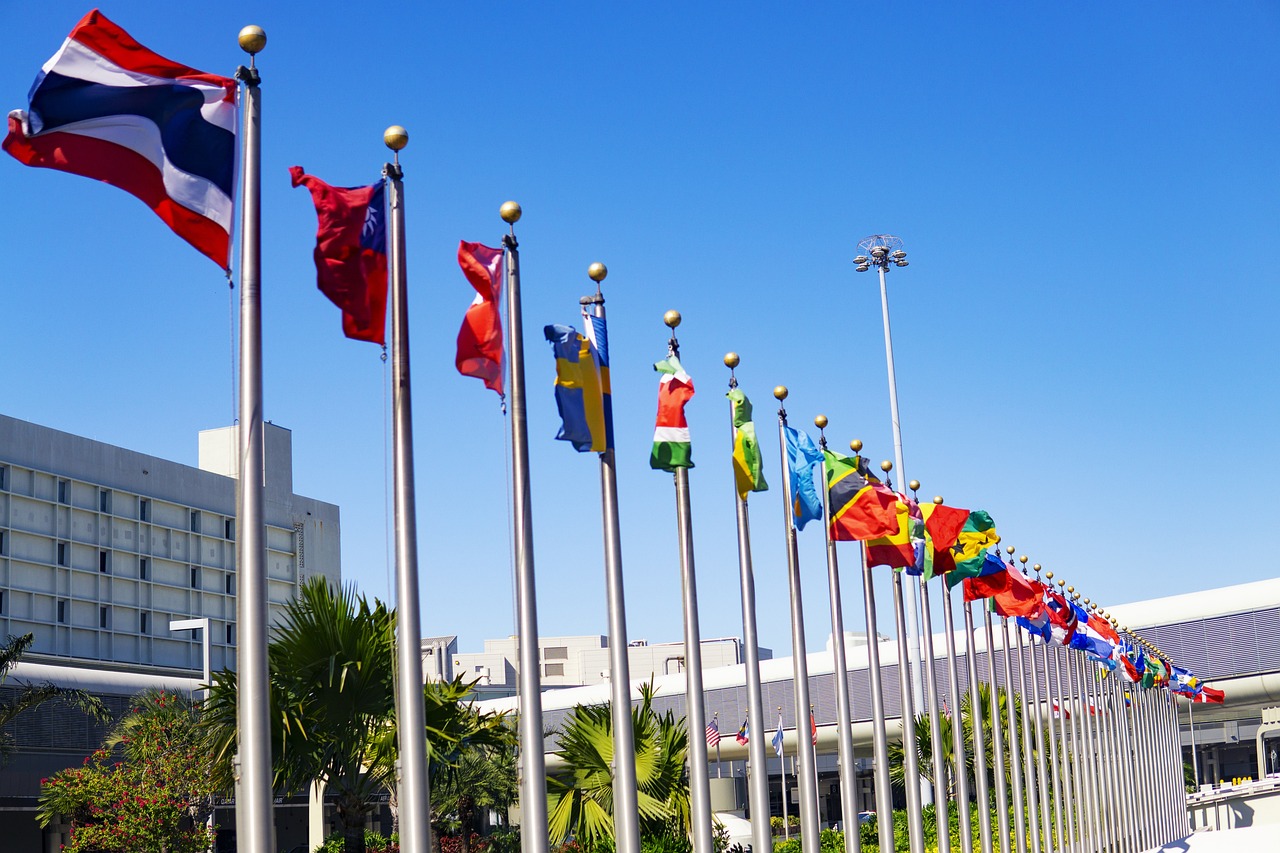
Globalization and Economic Policy Responses
Globalization is not just a buzzword; it’s a transformative force that reshapes economies, cultures, and political landscapes across the globe. As borders blur and nations become more interconnected, the question arises: how do different political philosophies respond to the challenges and opportunities presented by globalization? It’s a complex dance of ideologies, each offering unique perspectives on trade, labor rights, and environmental regulations.
At the heart of this discussion lies the recognition that globalization can lead to both prosperity and disparity. For instance, libertarianism champions free trade and minimal government interference, arguing that open markets drive competition and innovation. Proponents of this philosophy believe that by reducing tariffs and trade barriers, countries can maximize their economic potential. However, this approach often overlooks the potential for job losses in specific sectors, leaving many workers vulnerable. On the flip side, socialist ideologies advocate for protective measures that prioritize labor rights and equitable wealth distribution. They argue that without adequate safeguards, globalization may exacerbate inequality, benefiting corporations at the expense of the working class.
To illustrate these contrasting viewpoints, consider the following table that summarizes key policy responses to globalization:
| Political Philosophy | Policy Response | Potential Outcomes |
|---|---|---|
| Libertarianism | Promote free trade, reduce tariffs | Increased competition, economic growth, but potential job losses |
| Socialism | Implement protective labor laws, regulate trade | Enhanced worker rights, reduced inequality, but potential trade restrictions |
As nations grapple with these philosophical divides, the responses to globalization can vary significantly. For example, countries like Germany have embraced a mixed approach, balancing free market principles with strong social safety nets. This model has allowed them to remain competitive globally while also ensuring that their workforce is protected and supported. Conversely, nations that lean heavily towards deregulation often find themselves facing backlash from labor groups and citizens concerned about job security and environmental impacts.
Moreover, globalization has introduced pressing issues like climate change, which require a thoughtful examination of economic policies through a philosophical lens. Green politics is emerging as a significant player in this arena, advocating for sustainable practices that address both economic and environmental concerns. This perspective highlights the need for a holistic approach to globalization, one that considers the long-term consequences of economic decisions on our planet.
Ultimately, the interplay between political philosophy and globalization is a dynamic and evolving relationship. As we move further into the 21st century, it’s clear that the decisions we make today will shape the economic landscape of tomorrow. The challenge lies in finding a balance that fosters innovation and growth while also protecting the rights and welfare of individuals. As we navigate this complex terrain, it’s essential to remain open to dialogue and collaboration across ideological lines, ensuring that globalization serves as a bridge rather than a barrier.
- What is globalization? Globalization refers to the process of increased interconnectedness and interdependence among countries, often characterized by trade, investment, and cultural exchange.
- How do different political philosophies view globalization? Libertarians typically support free trade and minimal regulation, while socialists advocate for protective measures to ensure labor rights and economic equality.
- What are the potential benefits of globalization? Benefits can include economic growth, access to a wider variety of goods and services, and increased cultural exchange.
- What are the criticisms of globalization? Critics argue that globalization can lead to job losses, environmental degradation, and increased inequality if not managed properly.

Climate Change and Economic Strategies
When we talk about climate change, it’s not just an environmental issue; it’s a profound economic challenge that requires immediate attention and innovative strategies. As the planet warms, the economic implications ripple through various sectors, affecting everything from agriculture to insurance. So, how do different political philosophies shape the economic strategies we adopt to combat climate change? It's a complex interplay that reveals much about our values and priorities.
At the heart of this discussion lies the understanding that climate change is not a standalone issue; it intersects with social justice, economic inequality, and global cooperation. For instance, capitalist frameworks often prioritize short-term profits over long-term sustainability, leading to policies that may neglect the urgent need for environmental protection. On the flip side, socialist ideologies advocate for a more equitable distribution of resources, which can foster a collective approach to tackling climate change. This means investing in renewable energy, public transportation, and sustainable agriculture, all of which require substantial government intervention and funding.
Consider the Scandinavian model again, which brilliantly showcases how a balanced approach can yield positive results. Here, governments actively invest in green technologies and implement strict environmental regulations, yet they also ensure that the economic burden does not fall disproportionately on the lower-income population. This dual focus not only addresses climate change but also promotes social equity, proving that environmental and economic strategies can indeed go hand in hand.
However, implementing effective economic strategies to combat climate change is not without challenges. One major hurdle is the global nature of the issue. Climate change knows no borders, and thus, it requires international cooperation and policy alignment. Countries with differing political philosophies often clash on how best to address these challenges. For example, while some nations may push for aggressive carbon taxes to deter fossil fuel use, others may argue for a more gradual approach, fearing economic repercussions. This divergence can lead to a lack of cohesive global action, which is crucial in the fight against climate change.
Moreover, ethical considerations play a pivotal role in shaping economic strategies. As we formulate policies, we must ask ourselves: Who bears the cost of these changes? Are we prioritizing the needs of the most vulnerable populations, or are we allowing corporate interests to dictate the terms? The answers to these questions often depend on the political philosophy at play. For instance, a more libertarian approach might advocate for market-driven solutions, arguing that innovation will naturally lead to a greener economy. In contrast, a socialist perspective might emphasize the need for direct government intervention to ensure that the most affected communities receive the support they need.
In conclusion, the relationship between climate change and economic strategies is intricate and multifaceted. Political philosophies provide the framework through which we interpret the urgency of climate action and the methods we choose to implement. As we navigate this critical juncture in history, it's essential to keep the dialogue open and inclusive, ensuring that all voices are heard in the quest for sustainable solutions.
- How does political philosophy affect climate change policies?
Political philosophy shapes the values and priorities that guide policy decisions, influencing whether a government takes a more market-driven or interventionist approach to climate change. - What is the Scandinavian model?
The Scandinavian model combines elements of socialism and capitalism, promoting social welfare while encouraging economic competitiveness and innovation, particularly in environmental sectors. - Why is international cooperation important in combating climate change?
Climate change is a global issue that transcends borders, requiring countries to work together to create effective and cohesive policies that address the problem on a worldwide scale.
Frequently Asked Questions
- What is the relationship between political philosophy and economic policies?
The relationship between political philosophy and economic policies is deeply intertwined. Political philosophies provide the foundational beliefs that guide how governments approach economic issues. For example, a government influenced by libertarianism may prioritize free market principles and minimal intervention, while a socialist government might focus on wealth redistribution and social welfare. These philosophical underpinnings shape everything from regulatory frameworks to social safety nets.
- How do historical political philosophies affect modern economic strategies?
Historical political philosophies lay the groundwork for contemporary economic strategies by influencing the values and priorities of current political systems. For instance, the ideas of philosophers like John Locke and Karl Marx continue to resonate today, shaping debates around property rights, individual freedoms, and economic equality. Understanding these historical contexts helps us grasp why certain economic policies are favored in different political climates.
- What are the main critiques of libertarian economic policies?
Critiques of libertarian economic policies often center around the potential for increased inequality and exploitation in unregulated markets. Critics argue that while free markets can drive innovation, they can also lead to significant disparities in wealth and access to resources. This has led to calls for a more balanced approach, incorporating regulatory measures to protect vulnerable populations and ensure fair competition.
- Can you explain the Scandinavian model of social democracy?
The Scandinavian model of social democracy is often cited as a successful blend of socialism and capitalism. It emphasizes a strong welfare state that provides essential services like healthcare and education, while also fostering economic competitiveness and innovation. This model demonstrates that it’s possible to achieve both economic growth and social equity, making it a point of reference for other nations exploring similar paths.
- What challenges do contemporary political philosophies face in addressing climate change?
Contemporary political philosophies face significant challenges in addressing climate change, particularly in how they balance economic growth with environmental sustainability. Different philosophies propose varied responses, from aggressive government intervention to promote green technologies to market-based solutions that rely on innovation. The effectiveness of these strategies often hinges on the underlying ethical considerations and the willingness of societies to prioritize long-term ecological health over short-term economic gains.
- How does globalization impact economic policy responses?
Globalization significantly impacts economic policy responses as nations navigate a complex web of international trade, labor rights, and environmental regulations. Political philosophies influence how countries approach these challenges, with some advocating for open markets and free trade, while others stress the importance of protecting local industries and labor standards. The debate continues, reflecting differing views on the benefits and drawbacks of an interconnected global economy.













